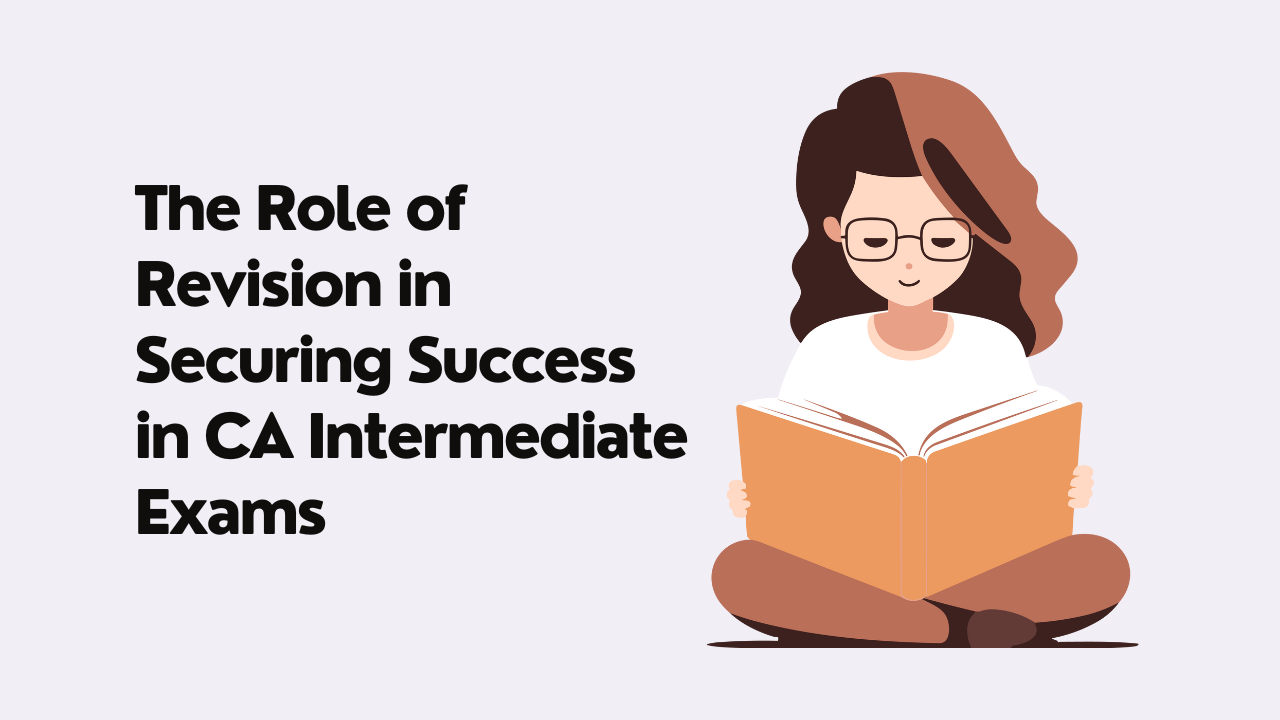
Success in the CA Intermediate exams hinges not only on comprehensive study but also on effective revision strategies. In this guide, we delve into the pivotal role that revision plays in securing success in these critical examinations.
Revision serves as the linchpin of exam preparation, consolidating knowledge and reinforcing key concepts. It is the process through which information moves from short-term to long-term memory, ensuring retention and recall during examinations. By revisiting and reviewing CA intermediate study material multiple times, candidates deepen their understanding, identify areas of weakness, and fortify their grasp on complex topics.
1. Structured Revision Schedules
Implementing a structured revision schedule is paramount. Divide study CA intermediate study materials into manageable sections and allocate specific time slots for revising each topic. This approach ensures comprehensive coverage and prevents last-minute cramming.
2. Active Engagement
Active reading of CA Intermediate Books could be more effective for retention. Instead, engage actively with the material through techniques such as summarizing, paraphrasing, and quizzing. Active engagement enhances understanding and reinforces learning.
3. Utilization of Resources
Leverage a diverse range of resources, including CA Entrance Exam books, lecture notes, online tutorials, and practice exams. Varied resources provide different perspectives and facilitate a deeper comprehension of complex subjects.
4. Mind Mapping
Visual aids such as mind maps are invaluable tools for organizing information and identifying interconnections between topics. Creating visual representations of key concepts enhances memory retention and aids in conceptual understanding.
5. Regular Review
Reviewing previously revised CA intermediate study material is crucial for long-term memory retention. Learners reinforce their understanding and prevent forgetting by incorporating consistent review sessions into the revision schedule. This practice enhances retention and promotes effective learning, ensuring knowledge consolidation and mastery of the subject matter.
1. Active Recall
Engage in active recall by attempting to retrieve information from memory without referring to notes or CA Intermediate books. This practice strengthens neural connections and enhances long-term retention.
2. Spaced Repetition
Employ spaced repetition techniques to maximize learning retention. Gradually extend review intervals over time, reinforcing memory and counteracting the forgetting curve. This method enhances long-term retention by strategically timing review sessions, ensuring efficient recall and mastery of the material while minimizing the effects of memory decay.
3. Interleaved Practice
Interleave practice sessions across different topics with the help of Scanner CA Intermediate Books rather than focusing on a single subject at a time. This approach enhances retention and promotes deeper learning by forcing the brain to make connections between disparate concepts.
4. Self-Assessment
Regular self-assessment through practice exams and quizzes is indispensable for gauging progress and identifying areas for improvement. Analyze mistakes and misconceptions to target specific areas requiring further revision.
1. Confidence Boost
Thorough revision instills confidence in candidates, alleviating exam anxiety and enabling them to perform to the best of their abilities.
2. Consolidation of Knowledge
Revision solidifies understanding and consolidates knowledge, ensuring that candidates can apply concepts effectively in exam scenarios.
3. Identification of Weaknesses
Through revision, candidates identify and address areas of weakness, thereby minimizing the risk of encountering unfamiliar or challenging questions during exams.
4. Optimized Time Management
Efficient revision strategies facilitate effective time management during exams, enabling candidates to allocate time appropriately to each section and question.
Revision serves as a cornerstone for achieving success in CA Intermediate exams. Implementing structured revision schedules, engaging in active learning techniques, and employing effective revision strategies are pivotal. These practices allow candidates to optimize their preparation, enhance understanding, reinforce concepts, and ultimately increase their likelihood of excelling in these significant examinations.
© 2024 Scanner Adda All rights reserved | Design by Shuchita Technologies